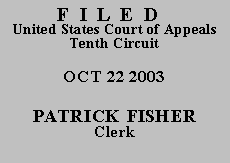

| UNITED STATES OF AMERICA, |
|
This court "construe[s] a defendant's plea agreement according to contract principles and what the defendant reasonably understood when he entered his plea." United States v. Chavez-Salais, 337 F.3d 1170, 1172 (10th Cir. 2003) (internal quotation marks omitted). Therefore, a "defendant's knowing and voluntary waiver of the statutory right to appeal his sentence is generally enforceable." United States v. Elliot, 264 F.3d 1171, 1173 (10th Cir. 2001) (quotation omitted). However, because even a defendant who chooses to waive his appellate rights does not thereby
subject himself to being sentenced entirely at the whim of the district court[,] [a]ppellate waivers are subject to certain exceptions, including where the district court relied on an impermissible factor such as race, where ineffective assistance of counsel in connection with the negotiation of the waiver renders the waiver invalid, where the sentence exceeds the statutory maximum, or where the waiver is otherwise unlawful.
Id. (internal quotation marks omitted). We have also recognized that a valid waiver must be knowing and voluntary. See United States v. Cockerham, 237 F.3d 1179, 1183 (10th Cir. 2001); see also Fed. R. Crim. P. 11(b). Absent one of these narrow exceptions, we generally will enforce waivers of appellate review. See, e.g., Elliott, 264 F.3d at 1173; United States v. Rubio, 231 F.3d 709, 712 (10th Cir. 2000); United States v. Hernandez, 134 F.3d 1435, 1437 (10th Cir. 1998).
The plea agreement signed by Mr. Montgomery on October 19, 2000, expressly provides that he "knowingly and voluntarily waives his right to appeal or collaterally challenge . . . Defendant's sentence as imposed by the Court and the manner in which the sentence is determined." Aplee. Supp. App. at 18. He affirmed that waiver at the change of plea hearing. Aplt. App. at 23. Mr. Montgomery does not assert that his waiver was not knowingly and voluntarily made, that the district court relied on an impermissible factor in sentencing, that he had ineffective assistance of counsel, or that the district court made an upward departure from the sentencing guidelines. Instead, Mr. Montgomery essentially claims that the imposition of restitution was improper because of a civil settlement between the Bank and others.
Mr. Montgomery's objections to imposition of restitution were thoroughly aired in the district court and rejected. See Aplt. App. at 36-95. To allow Mr. Montgomery to appeal the district court's sentence "would be to allow [him] to render a sham his promise not to contest his conviction and sentence in any direct or collateral appeal and would deprive the government of the benefit of its bargain, for which it rendered valuable consideration to [Montgomery]." Elliot, 264 F.3d at 1174 (internal quotation marks omitted).
Accordingly, having found the waiver valid, and this appeal falling within its plain language, we enforce the waiver and DISMISS this appeal.
Entered for the Court
Paul J. Kelly, Jr.
Circuit Judge
*. This order and judgment is not binding precedent, except under the doctrines of law of the case, res judicata, and collateral estoppel. This court generally disfavors the citation of orders and judgments; nevertheless, an order and judgment may be cited under the terms and conditions of 10th Cir. R. 36.3.
2. After examining the briefs and the appellate record, this three-judge panel has determined unanimously that oral argument would not be of material assistance in the determination of this appeal. See Fed. R. App. P. 34(a); 10th Cir. R. 34.1(G). The case is therefore ordered submitted without oral argument.